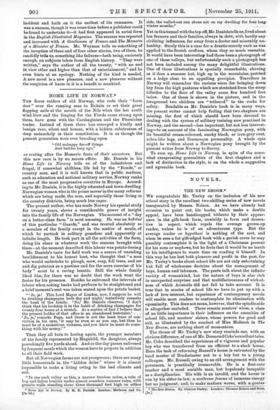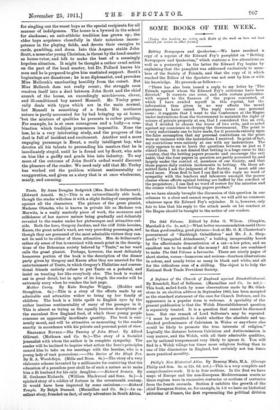NOVELS.
THE NEW BROOM.*
Ws congratulate Mr. Turley on the- inclusion of his new school story in the excellent two-shilling series of new novels inaugurated by Messrs. Nelson. As we have already had occasion to point • out, his books, which make a double appeal, havebe . en handicapped hitherto by their appear- ance in the gift-hook form, unwieldy in form and decora- tive in aspect, which repels the average grown-up reader, unless- he is . of an adventurous type. But the average reader en hypothesi is nothing of the sort, and when he sees-afat giltiedged book with a garish cover he may possibly contemplate it in the light of a Christmas present for his sons or nephews, but he-feels that it would be an insult to his intelligence to waste time on reading it himself. In this way be has lost both pleasure and profit in the past, for Mr. Turley's books about school life are not only entertaining but full of wholesome doctrine about the management of boys, human and inhuman. The poets talk about the infinite variety of womankind, but the nature of boys is also rich in unexpected surprises and that multifariousness of wicked- ness of which Aristotle did not fail to take account. It is true that in stories of school life we have to put up with a lack of love interest, but experience of contemporary novels will enable most readers to contemplate its elimination with equanimity. This does not mean, however, that the spindle-side is altogether excluded. There remain masters' wives, a class of no little importance in their influence on the amenities of school life, and masters' sisters, whose powers for good and evil, as illustrated by the conduct of Miss Mellersh in The New Broom, are nothing short of momentous.
The theme of Mr. Turley's new story reminds one, with an obvious difference, of one of Mr. Desmond Coke's excellent tales. Mr. Coke described the experiences of a vigorous and popular boy who was transferred from an efficient to a slack house. Here the task of reforming Russell's house is entrusted by the head master of Bradminster not to a boy but to a young colleague. Mr. Russell, owing to an old arrangement with the governors, is practically irremovable. He is a first-rate- teacher and a most amiable man, but hopelessly incapable as a disciplinarian. His wife is an invalid, and the house is run by hie sister-in-law, a maitresse femme of immense energy but no judgment, and, to make matters worse, with a genius • The New Broom, By Charles Turley. London : Thomas Nelson and Sons. [2s.]
for singling out the worst boys as the special recipients for all
manner of indulgences. The house•is a byword in the school SOME BOOKS OF THE for slackness ; an anti-athletic tradition has grown up ; the elder boys acquiesce cheerfully in their notorious incom- petence in the playing fields, and devote their energies to
cardsmblin and dress Into this ugean A stable John , ga
Scott, a muscular young Christian, is thrust by the head-master as house-tutor, and left to make the best of a seemingly hopeless situation. It might be thought a rather cruel action on the part of the head master, but Dr. Pollard knows his man and he is prepared to give him unstinted support. Scott's beginnings are disastrous ; he is no diplomatist, and provokes Miss Mellersh's unrelenting hostility from the outset. But Miss Mellersh does not really count ; the struggle soon resolves itself into a duel between John Scott and the chief smirch of the house, an exceedingly mischievous, clever, and ill-conditioned boy named Mansell. Mr. Turley gene- rally deals with types which are in the main normal, but Mansell is something of a freak. His mutinous nature is partly accounted for by bad bringing up at home, but the mixture of qualities he presents is rather puzzling. Por example, he is at once courageous and a bully—a com- bination which tradition pronounces impossible. None the less, he is a very interesting study, and the progress of the duel is full of incident and excitement. Another and a more engaging personage is Brent, a really intelligent boy, who devotes all his talents to persuading his masters that he is inordinately stupid, until he is found out by Scott, who acts on him like a gadfly and goads him into industry. To say more of the outcome of John Scott's ordeal would discount the pleasure of the reader. We need only add that Mr. Turley has worked out the problem without sentimentality or exaggeration, and given us a story that is at once wholesome, manly, and amusing.



















































 Previous page
Previous page